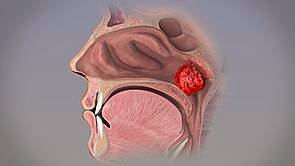Nasal adenoids and their symptoms and everything that interests you about the adenoid process
We hear a lot about someone who has adenoids and that they should be removed. This complaint is always associated with tonsillitis, so what is it? for the flesh of the nose And what are its benefits? And when should it be removed and does that have risks? Follow this article with us.
What is nasal polyps?
Adenoids are part of the immune system such as lymph nodes. The shape of the nasal polyps is characterized as a small mass of soft and smooth tissue located behind the nasal cavity. Like lymph nodes, it consists of lymphoid tissue interspersed with white blood cells that work to protect the body and combat any foreign bodies that enter it.
We all have nasal polyps from birth, but they start to shrink with adolescence, and they disappear completely in most adults.
Diseases caused by nasal fever
Having a problem with polyps in the nose can cause several health problems, such as:
- Inflammation of the adenoids due to a bacterial or viral infection.
- Adenoids enlarge, especially in children, causing breathing problems.
- Sleep Apnea As a result of nasal obstruction.
- Otitis media due to obstruction of the Eustachian tubes caused by enlarged adenoids.

Symptoms of enlarged nasal polyps
Enlargement and swelling of the adenoids can occur for no apparent reason, and even a child may be born enlarged. The adenoids may also swell while fighting an infection inside the body, and may remain in their abnormal size even after the infection is cured.
This inflation can cause several problems and symptoms that appear on the child or even the adult, leading to difficulty in breathing through the nose normally, which leads to:
How do I get rid of adenoids?
Adenoid enlargement can actually make it difficult to live and carry out daily activities, so many people look for a treatment for nasal polyps first before resorting to finally eradicating them. After the diagnosis, which appears in a physical examination or using binoculars or x-rays, the doctor may prescribe a nasal spray that helps reduce inflation, The doctor may prescribe some antibiotics in the event of a bacterial infection causing this inflation.
But if the problem and disturbing symptoms persist in the long term, it is inevitable to resort to surgery to remove the adenoids, which is often done at a young age from one to 7 years old, because often the adenoids will shrink on their own with growth, but the problem may continue with adults. Moreover.
Benefits of removing polyps in the nose
Despite the importance of the presence of adenoids in the immune system, its removal, especially at a young age with a defect in it, may have the following benefits:
- Improve breathing.
- Treating the problem of sleep apnea.
- Treating the persistent problem of stuffy nose.
- Snoring treatment.
- Reducing ear infection and sinus infection.
But all these benefits are not guaranteed because these problems and symptoms may be caused by problems other than the adenoids, so it is necessary to discuss all the details with the doctor and do all the necessary tests to confirm that the adenoids are what actually causes these problems and not another reason.
Nose surgery
This operation is considered one of the routine operations in which the patient is discharged from the hospital on the same day, as it is a simple operation although it is performed under general anesthesia, during which the doctor expands the mouth using medical pliers to reach the end of the throat up to the nasal cavity to remove the adenoids using several techniques, He may also use other devices to stop the bleeding, and the operation lasts from 20 to 30 minutes.
After the operation, the patient is transferred to the recovery room until he wakes up from anesthesia, and after measuring his vital processes, he can leave the hospital on the same day and spend the recovery period at home.
Is a nose job dangerous?
Usually there are no special problems or complications for the operation, but like any surgery it may include some risks that include bleeding, infection or anesthesia problems, so you should discuss with your doctor before the operation about the potential risks and inform him of the existence of any special health condition such as allergies or Blood flow problems, whether you are the one who will undergo the operation or your child.
But you should go to the doctor immediately in case:
- Light colored blood coming out of the mouth.
- fever and chills
- Severe pain that continues even after taking painkillers.
- Inability to take or swallow liquids.
Recovery after removal of nasal polyps
- Immediately after the operation, there may be a normal feeling of discomfort and some symptoms that rarely occur, such as ear pain, sore throat, bad breath, difficulty swallowing, and stuffy nose.
- The doctor may prescribe some pain relievers such as paracetamol or aspirin, but it is not recommended to take aspirin for children under 16 years old.
- After several days, the patient will be able to eat soft foods normally, but the most important thing is to drink plenty of fluids to avoid dehydration.
- After resting for several days (the recovery period may last up to 10 days), the patient can return to his normal activities and the child can return to his school, but on the condition that he stays away from any sick or infected person.
Damage to the adenoid process in the nose
Unfortunately, the operation can fail to treat the problems that you or your child suffers from. As for the damages of the adenoid operation in the nose, it can include:
- Failed treatment of sinusitis and otitis media.
- Permanent change in voice, but it rarely occurs.
- Recurrent infection.
- Failure to remove the operation breathing difficulties Snoring and sleep apnea.
- In rare cases, excessive bleeding may occur during or after the operation, which requires a blood transfusion.
- The operation cannot treat allergies, which requires an allergy test and another treatment for allergies that can cause the same breathing problems.
Finally, you should be sure to ask the doctor about the advantages and disadvantages of adenoid surgery and about the treatment options for enlarged adenoids before removing them, and also you should undergo all the necessary examinations to ensure that you do not suffer from any other health problem that may cause you the breathing problems that you suffer from.

